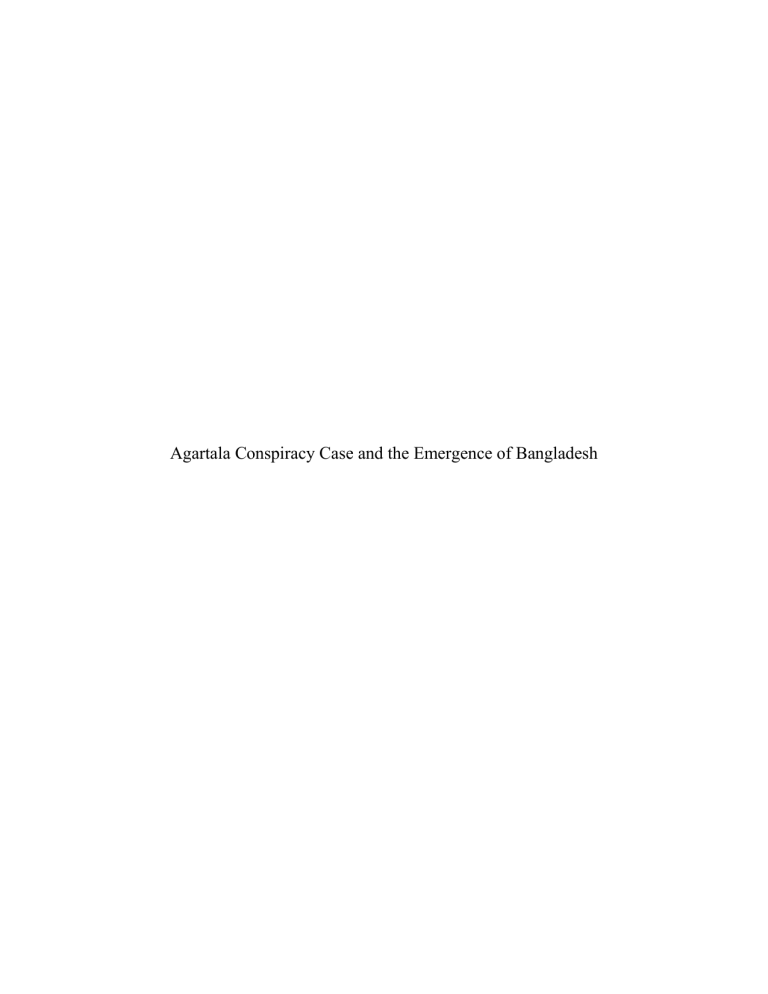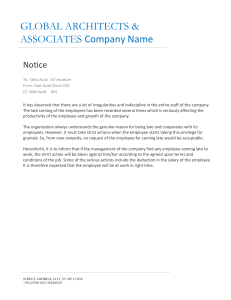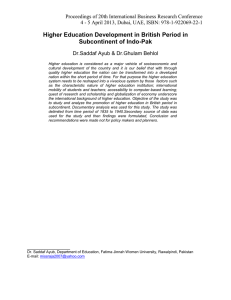Agartala Conspiracy and the Emergence of Bangladesh (his103 report)
advertisement

Agartala Conspiracy Case and the Emergence of Bangladesh Abstract The Agartala Conspiracy was developed prior to the 1971 Bangladesh Liberation War. This study explains the historical placement, key characters, primary causes, and consequences of the conspiracy. The study aims to explain why the Agartala Conspiracy Case was developed, along with the development of “State vs Sheikh Mujib” and how it led to the emergence of Bangladesh and its formation as an independent nation. This report highlights the intricate political structure of Pakistan under the dictatorship of General Ayub Khan and his strategies for pushing this case forward. We also learn about the position of East Pakistan, the struggles of its leader, Sheikh Mujibur Rahman, along with so many others, and finally we see the significance of the conspiracy in kindling the Bengali nationalist movement that ultimately gave rise to Bangladesh. Agartala Conspiracy Case and the Emergence of Bangladesh The Agartala Conspiracy Case was a case which stated that East Pakistan, under the leadership of Sheikh Mujibur Rahman, the then Awami League Party chief, along with some inservice and ex-service army personnel and high government officials, had formally abandoned themselves from the East Wing of Pakistan with the help of the Indian government. A series of events that unfolded in Agartala, a city in present-day India, circa 1968. It played a pivotal role in galvanizing the struggle for independence in East Pakistan, which eventually resulted in the emergence of Bangladesh as a sovereign nation. This report aims to examine the Agartala Conspiracy and its profound impact on the political landscape of the region. After the partition of India in 1947, East Pakistan, with its predominantly Bengali population, became a part of Pakistan. However, the political and cultural differences between East and West Pakistan created tensions, leading to a growing sense of disillusionment among Bengalis. The Agartala Conspiracy is a gradual aftermath of that. The creation of Pakistan was not a smooth one. Nine years of constitution-making led to just two years of action. In 1958, General Ayub Khan seized the presidential position after former president Iskander Mirza abrogated the constitution and placed General Ayub Khan as the chief martial law administrator. Desk, O. W. (2023). How Pakistan’s Military Dictated The Country Over The Years. Ayub Khan went on to rule for a whole decade, 1958–1968. His regime attempted to bring economic development to the nation. Although the regime made advancements, it also brought problems and an intensified eastwest conflict. The demand for autonomy in the east was revived, and Ayub Khan’s grip on power kept sliding off. Myrdal, G. (1968). Asian Drama. The charismatic Sheikh Mujibur Rahman, leader of the Awami League, activated the ‘SixPoint Program" with full force. The singular purpose of it was to achieve autonomy for East Pakistan. Rahman. A. (2020). The Agartala Conspiracy Case Bangabandhu: The People’s Protagonist, 41 The six points were: 1) A legislative system with direct elections under the one-person, one-vote principle 2) Two separate reserve banks and currencies for the two wings of Pakistan 3) All issues other than defense and foreign policy will be dealt with by the federal provinces. 4) A paramilitary force for East Pakistan 5) Taxation, resource allocation, and such fiscal affairs will be the state's responsibility. 6) The two wings will separately handle monetary and trade policies, such as foreign reserve maintenance and establishing trade links. All you need to know about the Six-Point Movement in East Pakistan - Centre for Research and Information. (2022). Soon after the Indo-Pakistani war of 1965, the demand for autonomy with these six points was brought forward with the help of a group of Bengali military officers known as the Swadhin Bangla Biplobi Parishad (SBBS). Ayub Khan’s government tried to turn the story around by making allegations against this movement. Mentioning this was just a distraction for the secession of East Pakistan. The "secessionist conspiracy" (as named by Ayub Khan’s government) is trying to frame Mujib as a traitor in East Pakistan. This cheap shot backfired, as through this, Sheikh Mujib gained popularity, as did the Six Points in East Pakistan. The intimidation got to Ayub Khan and his government, and as a result, Sheikh Mujib was arrested in May 1966.Bokhari, H. (2021). The Agartala conspiracy and the resultant deification of Sheikh Mujib in East Pakistan. Global Village Space. The alleged assumption that this movement was aimed at tilting Pakistan off balance led to the development of the conspiracy, and other factors like Mujib’s scheme proving Ayub’s failure and the kidnapping attempt on Ayub leaving him vulnerable played important driving factors into turning the state against Mujib. Chowdhury, G.W. (1974). The last days of united Pakistan. The Fall of Ayub. p.22. The Agartala Conspiracy Case became the talk of the town after it was publicly announced on January 7, 1968. Arresting the ‘criminals’ had already begun in the late 1967s. The case truly developed after Mujib’s implication in it, which happened after a few days. Mujib was still in jail as per the 1966 arrest. Chowdhury, G.W. (1974). The last days of united Pakistan. The Fall of Ayub. p.22. Sheikh Mujib was released from jail only to be arrested later under court martial law; he was brought immediately to Dhaka Cantonment. Along with him, 34 others were arrested under Ayub Khan’s hand-picked tribunal. These people were: Ahmed Fazlur Rahman CSP, Commander Moazzem Hossain, Steward Mujibur Rahman, former LS Sultanuddin Ahmad, LSCDI Nur Mohammad, light Sergeant Mahfiz Ullah, Corporal Abdus Samad, former Havildar Dalil Uddin, Ruhul Quddus CSP, Flight Sergeant Md. Fazlul Haq, Bibhuti Bhushan Chowdhury alias Manik Chowdhury, Bidhan Krishna Sen, Subedar Abdur Razzaque, former clerk Mujibur Rahman, former Flight Sergeant Md. Abdur Razzaque, Sergeant Zahurul Haq, A.B. Khurshid, Khan Mohammad Shamsur Rahman CSP, AKM Shamsul Haque, Havildar Azizul Haq, Mahfuzul Bari, Sergeant Shamsul Haq, Shamsul Alam, Captain Md. Abdul Motaleb, Captain A. Shawkat Ali Mian, Captain Khondkar Nazmul Huda, Captain A.N.M Nuruzzaman, Sergeant Abdul Jalil, Mahbub Uddin Chowdhury, Lt. M Rahman, former Subedar Tajul Islam, Ali Reza, Captain Khurshid Uddeen Ahmed, and Lt. Abdur Rauf. The case hearing started on June 19, 1968, under sections 121-A and 131. The charge sheet consisted of 100 paragraphs. 227 witnesses and 7 approvers were at the tribunal where the sheet was presented. Three judges—the chair, Justice SA Rahman, MR Khan, and Maksumul Hakim— were in charge of the tribunal. The Attorney General, TH Khan, and former Foreign Minister Manzur Quader represented the government. A British lawyer by the name of Thomas Williams, along with local attorneys, voiced their opposition to the formation of the tribunal by filing a petition in favor of Sheikh Mujib. Eventually, the approvers testified, admitting Their false evidence that they provided under the coercion of the state Among the arrested were Sergeant Zahurul Haq and Flight Sergeant Fazlul Haq. On the morning of February 15, 1969, a Pakistani habildar shot Sergeant Zahurul Haq at his cell. This news incident had fueled the fire amongst the East Pakistanis, establishing a huge turning point in the whole conspiracy fiasco. Ahsan, S.B. (2007). February 1969: Revisiting the Agartala Conspiracy Case. FORUM. The Daily Star. This killing was a clear indication of how Ayub Khan wanted mass movements against the East Pakistan government. The oppressive policies were no longer tolerated as students of Dhaka University deserted the classrooms and set out to march for the resignation of Ayub Khan, furthering the Ayub movement. Fire was set on the rest house, forcing Justice SA Rahman, and Foreign Minister Manzur Quader to flee secretly. Mujib’s freedom was demanded with animosity. A Roundtable Conference was to be arranged by the newly formed Democratic Action Committee in Rawalpindi. The Awami League denied any proposal to be a part of it unless unconditional release was given to Mujib and others, dropping the case entirely. The Awami League being the strongest component of the committee, Ayub Khan offered Mujib the opportunity to attend the conference while on parole. This offer, however, was denied too. A prominent politician, Maulana Bhashani, rejected this offer as well. The case was in shambles. The protests kept growing. Brave students defied Section 144 and kept pushing their slogans to free Mujib. Many lost their lives to police shootings. The mass movement of the ‘Bangalis’ resulted in the unconditional withdrawal of the case and the release of the arrested. February 22, 1969 On the 23rd, Sheikh Mujib, with his new title ‘Bangabandhu," was welcomed with flying colors in the race course field amongst thousands. The aftermath of this was the end of Ayub’s dictatorship. The case and its downfall gave birth to stronger Bengali nationalism. Through the celebrations of pride, culture, and heritage, the 1970s elections had arrived. The Awami League, with more love and support form locals than ever dominated the elections in the Pakistani parliament. However, more peril was yet to come. The president of Pakistan, Yahya Khan, and West Pakistani politician Zulfikar Ali Bhutto opposed the formation of the government by Mujib, and another series of hostilities began. Mujib was arrested again on the night of March 25, 1971. Before that, he laid out his clear instructions and request to the people of Bangladesh to fight for independence. The liberation war had broken down. The ‘Bangalis’ did not disappoint Mujib as the independent state of Bangladesh was declared by the Awami League’s government-in-exile Mujibnagar, and Bengali nationalists formed the Mukti Bahini guerrilla force to fend off the Pakistanis. A long period of war and violence until December 16 resulted in the establishment of Bangladesh as an independent state. M.Ahmed, (1983). Era of Sheikh Mujibur Rahman, University Press. The emergence of Bangladesh was a series of struggles, violence, and bravery. The Agartala Conspiracy to trap Mujib into being framed as an anti-government individual and an agent of the Indians backfires as the people of East Pakistan start realizing Ayub’s actual intention. The arrest of Mujib and many others, followed by the killings of some prominent arrested individuals, enrages the Bengali people to a tipping point where they start to rebel beyond their own safety. Their blood, sweat, and tears resulted in an independent Bangladesh. This case allows us to understand the level of hunger people reach for power; we see it through the series of actions carried out by Ayub Khan and his government. It also allows us to understand devotion and effort for cause. We see Sheikh Mujib’s struggles one after another and how his efforts for the cause and the support of thousands known and unknown resulted in triumph. The birth of a nation with history and heritage to be proud of forever. References Desk, O. W. (2023). How Pakistan’s Military Dictated the Country Over the Years. https://www.outlookindia.com/. https://www.outlookindia.com/international/how pakistan-army-dictated-the-country-over-the-years-news-267470 Myrdal. G. (1968). Asian Drama. Rahman. A.(2020). The Agartala Conspiracy Case. Bangabandhu – The People’s Protagonist41. https://www.daily-sun.com/printversion/details/526389/The-Agartala-Conspiracy Case (2022). All you need to know about the Six-Point Movement in East Pakistan - Centre for Research and Information. Centre for Research and Information. https://cri.org.bd/2021/06/16/all-you-need-to-know-about-the-six-point-movement-ineast-pakistan/ Bokhari, H. (2021). The Agartala conspiracy and the resultant deification of Sheikh Mujib in East Pakistan. Global Village Space. https://www.globalvillagespace.com/theagartala-conspiracy-case-and-the-resultant-deification-of-sheikh-mujib-in-east-pakistan/ Chowdhury, G.W. (1974). The last days of united Pakistan. The Fall of Ayub. p.22. Ahsan, S.B. (2007). February 1969: Revisiting the Agartala Conspiracy Case. FORUM. The Daily Star. https://archive.thedailystar.net/forum/2007/february/feb69.htm Ahmed, M. (1983). Era of Sheikh Mujibur Rahman. University Press Baxter. C. (1997). Bangladesh: From a Nation to a State, Westview Press




